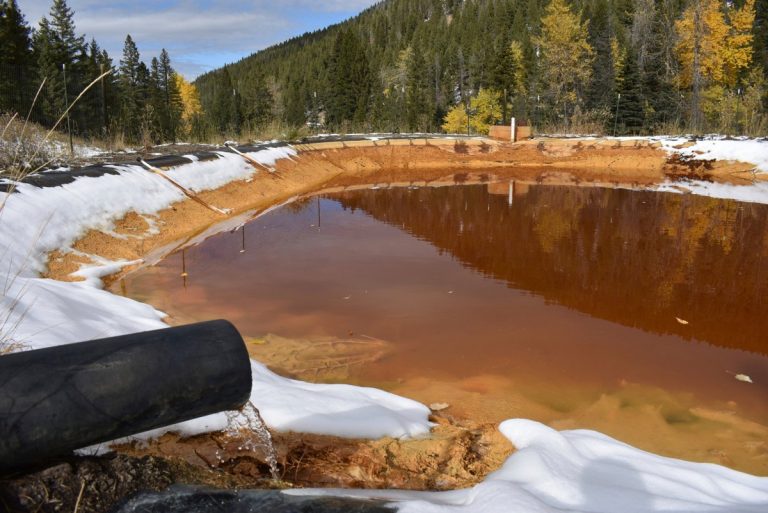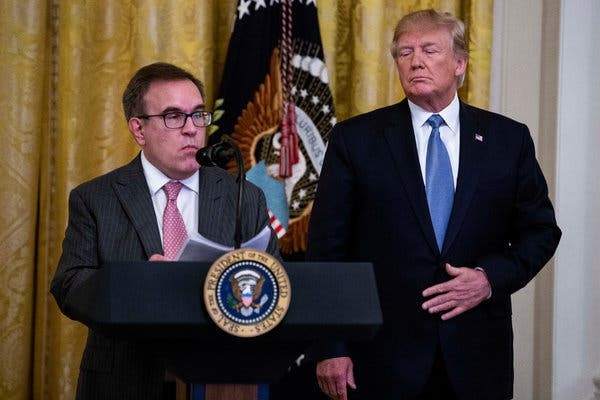November 11, 2019
WASHINGTON — The Trump administration is preparing to significantly limit the scientific and medical research that the government can use to determine public health regulations, overriding protests from scientists and physicians who say the new rule would undermine the scientific underpinnings of government policymaking.
A new draft of the Environmental Protection Agency proposal, titled Strengthening Transparency in Regulatory Science, would require that scientists disclose all of their raw data, including confidential medical records, before the agency could consider an academic study’s conclusions. E.P.A. officials called the plan a step toward transparency and said the disclosure of raw data would allow conclusions to be verified independently.

Contaminated waste water flowing from the Lee Mountain mine near Rimini, Mont., into a retention pond last year. Credit...Matthew Brown/Associated Press
“We are committed to the highest quality science,” Andrew Wheeler, the E.P.A. administrator, told a congressional committee in September. “Good science is science that can be replicated and independently validated, science that can hold up to scrutiny. That is why we’re moving forward to ensure that the science supporting agency decisions is transparent and available for evaluation by the public and stakeholders.”
The measure would make it more difficult to enact new clean air and water rules because many studies detailing the links between pollution and disease rely on personal health information gathered under confidentiality agreements. And, unlike a version of the proposal that surfaced in early 2018, this one could apply retroactively to public health regulations already in place.
“This means the E.P.A. can justify rolling back rules or failing to update rules based on the best information to protect public health and the environment, which means more dirty air and more premature deaths,” said Paul Billings, senior vice president for advocacy at the American Lung Association.
Public health experts warned that studies that have been used for decades — to show, for example, that mercury from power plants impairs brain development, or that lead in paint dust is tied to behavioral disorders in children — might be inadmissible when existing regulations come up for renewal.
For instance, a groundbreaking 1993 Harvard University project that definitively linked polluted air to premature deaths, currently the foundation of the nation’s air-quality laws, could become inadmissible. When gathering data for their research, known as the Six Cities study, scientists signed confidentiality agreements to track the private medical and occupational histories of more than 22,000 people in six cities. They combined that personal data with home air-quality data to study the link between chronic exposure to air pollution and mortality.
But the fossil fuel industry and some Republican lawmakers have long criticized the analysis and a similar study by the American Cancer Society, saying the underlying data sets of both were never made public, preventing independent analysis of the conclusions.
The change is part of a broader administration effort to weaken the scientific underpinnings of policymaking. Senior administration officials have tried to water down the testimony of government scientists, publicly chastised scientists who have dissented from President Trump’s positions and blocked government researchers from traveling to conferences to present their work.
In this case, the administration is taking aim at public health studies conducted outside the government that could justify tightening regulations on smog in the air, mercury in water, lead in paint and other potential threats to human health.
Scott Pruitt, the former administrator of the E.P.A., had made publication of underlying scientific data a top priority and tried to rush a proposal through the regulatory system in 2018. Mr. Pruitt resigned that July, and his successor, Mr. Wheeler, delayed the transparency rule and suggested the E.P.A. needed time to address the chorus of opposition from environmental and public health groups.

E.P.A. administrator Andrew Wheeler, left, with President Trump at the White House in July.Credit...Anna Moneymaker/The New York Times
But a draft of the revised regulation headed for White House review and obtained by The New York Times shows that the administration intends to widen its scope, not narrow it.
The previous version of the regulation would have applied only to a certain type of research, “dose-response” studies in which levels of toxicity are studied in animals or humans. The new proposal would require access to the raw data for virtually every study that the E.P.A. considers.
“E.P.A. is proposing a broader applicability,” the new regulation states, saying that open data should not be limited to certain types of studies.
Most significantly, the new proposal would apply retroactively. A separate internal E.P.A. memo viewed by The New York Times shows that the agency had considered, but ultimately rejected, an option that might have allowed foundational studies like Harvard’s Six Cities study to continue to be used.
An E.P.A. spokeswoman said in an emailed statement, “The agency does not discuss draft, deliberative documents or actions still under internal and interagency review.”
On Wednesday, the House Committee on Science, Space and Technology will hold a hearing on the E.P.A.’s efforts. A top pulmonary specialist and a representative of the country’s largest nonprofit funder of research on Parkinson’s disease, the Michael J. Fox Foundation, are expected to testify that the E.P.A.’s proposed rule would eliminate the use of valuable research showing the dangers of pollution to human health.
Mr. Pruitt’s original proposal drew nearly 600,000 comments, the vast majority of them in opposition. Among them were leading public health groups and some of the country’s top scientific organizations like the American Association for the Advancement of Science.
The National Association of Pediatric Nurse Practitioners said it was “deeply concerned” that the rule would lead to the exclusion of studies, “ultimately resulting in weaker environmental and health protections and greater risks to children’s health.” The National Center for Science Education said ruling out studies that do not use open data “would send a deeply misleading message, ignoring the thoughtful processes that scientists use to ensure that all relevant evidence is considered.” The Medical Library Association and the Association of Academic Health Science Libraries said the proposal “contradicts our core values.”
Industry groups said the rule would ensure greater public understanding of the science behind regulations that cost consumers money.
“Transparency, reproducibility and application of current scientific knowledge are paramount to providing the foundation required for sound regulations,” the American Chemistry Council wrote to the E.P.A. in support of the plan.
The new version does not appear to have taken any of the opposition into consideration. At a meeting of the agency’s independent science advisory board this summer, Mr. Wheeler said he was “a little shocked” at the amount of opposition to the proposal, but he was committed to finalizing it. Beyond retroactivity, the latest version stipulates that all data and models used in studies under consideration at the E.P.A. would have to be made available to the agency so it can reanalyze research itself. The politically appointed agency administrator would have wide-ranging discretion over which studies to accept or reject.
“It was hard to imagine that they could have made this worse, but they did,” said Michael Halpern, deputy director for the Center for Science and Democracy at the Union of Concerned Scientists, a nonprofit advocacy group. He added, “This is a wholesale politicization of the process.”
Academics are not typically required to turn over private data when submitting studies for peer review by other specialists in the field, or for publication in scientific journals, the traditional ways scientific research is evaluated. If academics were to turn over the raw data to be made available for public review, the E.P.A. would have to spend hundreds of millions of dollars to redact private information, according to one federal estimate.
The Six Cities study and a 1995 American Cancer Society analysis of 1.2 million people that confirmed the Harvard findings appear to be the inspiration of the regulation.
The proposal gives the public 30 days to offer comments on the changes to the E.P.A.’s plan. Agency officials have said they hope to finalize the measure in 2020.
“The original goal was to stop E.P.A. from relying on these two studies unless the data is made public,” said Steven J. Milloy, a member of Mr. Trump’s E.P.A. transition team who runs Junkscience.org, a website that questions established climate change science and contends particulate matter in smog does not harm human health.
He dismissed concerns that the new rule could be used to unravel existing regulations, but he said he did expect it to prevent pollution rules from getting tougher.
“The reality is, standards are not going to be tightened as long as there’s a Republican in office,” he said.

